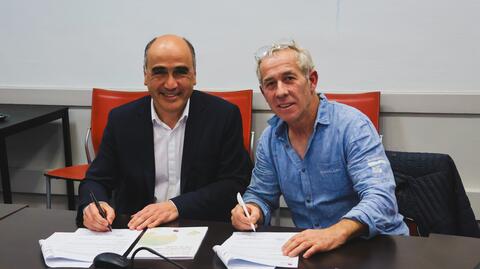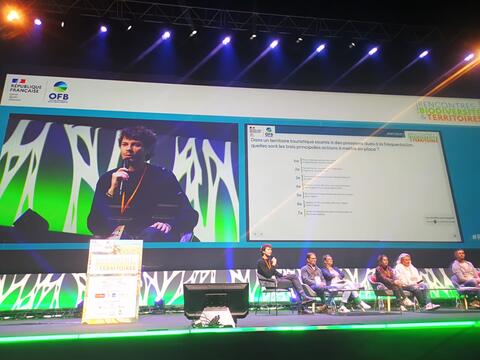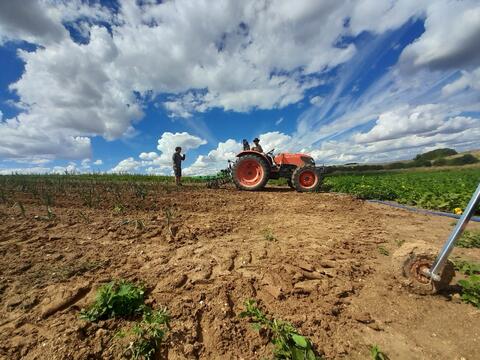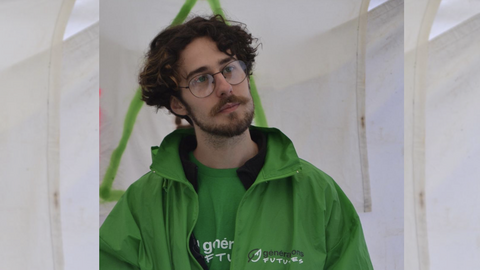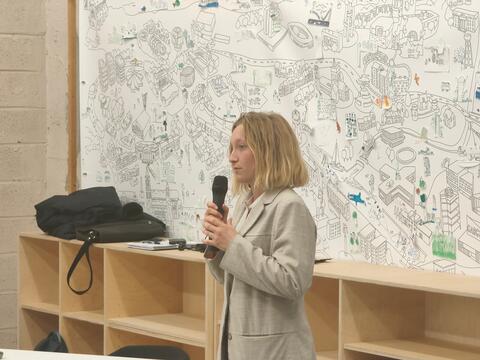The core objective of the Master of Public policy – Consultation and regions in transition (CTT) is to prepare agents of transition, professionals and citizens who not only understand the challenges of transformations currently underway but can drive these necessary transitions as well.

The core objective of the CTT program is to prepare agents of transition, professionals and citizens who not only understand the challenges of transformations currently underway but can drive these necessary transitions as well.
The relevance of such a program at Sciences Po Rennes stems from a firm belief that transitions are occurring and will continue, in politics, society and also in science. Solutions are needed – in economic, structural and governance-related decision-making – that go well beyond the quest to develop new techniques to protect the environment. They raise issues across society and must involve political decision-makers, economic stakeholders, non-profits and citizens.
The scope of action of agents of transition who complete the CTT program is broad. They must be able to work and act in a wide variety of structures, from non-profits, small and large private companies and regional authorities to national government agencies and international organizations. Areas of intervention include – but are not limited to – energy, climate, biodiversity, resources, waste, urban and rural development and agriculture.
Their efforts mobilize all forms of dialogue, based on the notion that transition is built on discussion, mediation and co-construction as much as it is on power relations. As the term implies, dialogue calls for discussion, but also reason.
This program prepares professionals and citizens capable of designing, organizing and leading transition initiatives and policymaking at public organizations, private companies and NGOs using participatory and forward-looking approaches in everything they do.
A major in participation
Where environmental issues are concerned, more than any other area, non-profits, companies and public organizations face a growing demand from the public for information, consultation and involvement. Meeting that expectation involves establishing a cooperative dialogue between stakeholders and citizens, transforming collectives and removing barriers to change. French and European law has evolved in this direction: project planners are obliged to include the public directly or indirectly in decision-making processes. A number of dialogue tools and processes have subsequently appeared, including public debate, citizens’ juries, neighborhood councils, development councils, Agenda 21, online forums and deliberative polls.
An in-depth understanding of civic engagement and the frameworks in which it develops (M2 - UE1 - Consultation tools and techniques) is an increasingly important and sought-after skill. An introduction to this discipline is taught in year one of the program (M1 - UE6 - Building the consultation process).
Teaching that explores dialogue from every angle
Engineering these approaches is only possible with a detailed understanding of dialogue from every angle.
Building and leading civic engagement strategies requires understanding the nature of individual and group interaction (M2 - UE1 - Psychosociology) and analyzing the nature of their positions (M2 - UE1 - Conflicts of scale, stakeholder conflicts) as well as their influence and agency (M2 - UE1 - Lobbying and advocacy).
Operational expertise is needed to incorporate stakeholder dialogue in projects and implement civic engagement policies. This involves targeted and effective communication (M2 - UE1 - Communication tools and techniques) and the ability to organize and lead communities (M2 - UE1 - Community organizing).
In addition to expertise, professionals must acquire the soft skills needed to adopt the appropriate position in a dialogue process. The ability to act as a facilitator and mediator is acquired through practice, supported by basic rules (M2 - UE1 - Facilitation: principles and practices) and by examining how one interacts with others on a personal level and in a group (M2 - UE1 - Sensory theatre).
A foundation for understanding social factors in transitions
Carrying out the necessary transitions to come is a social choice in which philosophic, political and economic considerations come into play. Understanding these factors enriches the public debate that graduates of the program will lead.
From the first signs of ecological crises, environmental ethics has looked at humankind’s relationship with nature. New biocentric, rather than anthropocentric, schools of thought are re-examining the intrinsic value that our societies place upon natural species and systems (M2 - UE2 - Environmental philosophy). This new trend is also re-shaping the formal and informal systems of governance used by stakeholders to take part in public decision-making, with the emergence of decentralized, participatory models as well as collective and community initiatives (M2 - UE2 - Governance in a world in transition). It is therefore important to understand how environmental issues fit into public policy at every level of decision-making (M2 - UE2 - Environmental public policies and transition), particularly in areas where environmental impact is high (M2 - UE2 - Regional energy policies, M2 - UE2 - Sustainable and participatory regional planning, M2 - UE2 - Urban planning and design documents in France, M2 - UE2 - Mobility and transitions). An overview of participatory approaches abroad (M2 - UE2 - International examples of consultation) further enriches this corpus on new developments in public decision-making.
Environmental impact is also making its way into economics, with the inclusion of neo-classical theory and the possible depletion of resources since the publication of the Club of Rome report, along with a recent re-examination of growth models and the concept of growth itself (M2 - UE2 - Environmental economics). New trends in economic theory are transforming the world of business and resulting in changes in approaches and practices (M2 - UE2 - Corporate social responsibility).
A major in foresight
Transitions are the result of micro-, meso- and macro-level changes over the long term. In an increasingly complex, uncertain, ambiguous and controversial world, a firm grasp of how to explore new worldviews, build shared visions and frameworks for their implementation are increasingly sought-after skills for local authorities, public organizations, companies and associations.
Foresight makes it possible to develop shared action strategies and stimulate the innovation and learning processes needed to coordinate alternative ways of consuming, producing, occupying spaces, getting around and interacting with nature. The goal is to build a collective transition seen as a process of change and transformation that protects the environment and future generations (M2 - EU 3: Foresight and transition policies). An introduction to this discipline is taught in year one of the program (M1 - UE3 - Introductory conference on foresight)
Teaching that explores every factor in transitions
Consultation and foresight are essential decision-making tools for all stakeholders in sustainable development. And yet, the two ‘disciplines’ are rarely connected. The consultation and regions in transition program offers something new: it familiarizes future professionals with these complementary approaches and how they can be combined and coordinated in the design and implementation of sustainable projects.
To be fully operational, they must be fueled by an understanding of the science underpinning major environmental issues: the climate, biodiversity, natural resources (M2 - UE4 - The climate: a scientific approach, M2 - UE4 - Biodiversity: a scientific approach, M2 - UE4 - Pollution: a scientific approach (in partnership with ENSICAEN), M2 - UE4 - Geography of resource deposits, M2 - UE4 - Technical approaches to waste and the circular economy, M2 - UE4 - Technical approaches to energy (in partnership with ENSICAEN), M2 - UE4 - Scientific approaches to food and agricultural challenges).
Practical training in project management
This career-oriented program aims to prepare students for the operational management of transition projects and policies. Graduates are skilled in the use of project organization and management tools (M2 - UE5 - Project management) and understand management principles in the context of managing change (M2 - UE5 - Tools for change management). The tools used to analyze, plan for and assess project impact are also important (M2 - UE5 - GIS - M2 - UE5 - Environmental impact studies, M2 - UE5 - Data processing).
Managing environmental projects of this kind requires an understanding of the legal frameworks (M2 - UE5 - Environmental law, M2 - UE5 - Environmental litigation: legal aspects) and economic and financial frameworks involved (M2 - UE5 - Environmental project funding).
Resolutely career-oriented
An apprenticeship at a public or private organization is an additional career tool for students, who can sign a professional training contract or apprenticeship contract. This career development system is an opportunity for students to invest themselves in real-world career experience and apply directly in the field what they’ve learned in the program.
During the apprenticeship year, students receive career guidance (M2 - UE6 - Career planning) and information about risk prevention (M2 - UE6 - Emotional harassment, M2 - UE6 - Prevention of psychosocial risks in the workplace).
The CTT program is a Public policy degree program. It is co-led by three higher-learning establishments in Rennes recognized for excellence in the humanities and social sciences: ENS Rennes, Université de Rennes 1 and Sciences Po Rennes.
Since its creation, the CTT program has offered partnerships with numerous structures. Every year, regional authorities, large firms and non-profits collaborate on environmental project assignments with first-year students (M1) and welcome apprentices throughout the academic year in year two (M2).
Partners include: Energie partagée, Enedis, RTE, EDF, Storengy, Futur Energy, GRTGaz, Engie, Missions Publiques, Etat d’Esprit, Aktan, Scopic, Impact & Environnement, Aire Publique, Comité 21, Maison du Monde, IRD2, Sièml, DREAL, Grand Paris Aménagement, Mairie de Paris, Nantes Métropole, Rennes Métropole, Brest Métropole, Archipel Habitat, Adeupa and Terre de Lien.
An active and effective network
The CTT program is taught by leading professionals from the various areas of networked urban services studied and relies on a CTT Anciens & Nouveaux alumni network.
CTT is a two-year program that includes:
- 793 hours of teaching by lecturers and professionals reputed in their field
- Field studies in groups (context studies, awareness-raising and consultation activities in year one (M1)
- Hands-on workshops and simulations
- A 38-week apprenticeship (professional training or apprenticeship contract) at a public, private or non-profit organization
Year one: students take multidisciplinary courses to cover the basics.
Year two: the program is completed on an apprenticeship basis, from September to July, with one week of classes every month and one week with the employer.
The curriculum is divided into seven modules that equip students with the following technical, cross-cutting skills:
Technical skills
Challenges in ecological transitions:
- Governance issues in a world in transition
- Analysis of international examples of consultation
- Analysis of controversy
- Environmental public policy issues
- Environmental law and environmental litigation: legal aspects
- Urban strategy / Rural strategy
- Environmental economics
- Corporate social responsibility
- Scientific culture and environmental technology
- Environmental impact studies
Methodology:
- Foresight tools and techniques
- Consultation tools and techniques
Cross-cutting skills and abilities
- Project leadership and environmental management: identifying and prioritizing needs, action strategies, assigning activities and tasks, workflow oversight, identifying risks, monitoring
- Multi-project management: Handling several projects simultaneously
- Team management
- Managing technical, institutional and societal challenges with stakeholders and mobilized expertise to adapt to complex situations
- Dialogue tools (e.g. facilitation, lobbying analysis, mediation and communication)
- Persuasion: public speaking
Written communication tools: visual presentations, strategic summary reports
Degree-seeking students
- First-year Master’s students (M1): applicants must pass the fourth-year entrance exam and hold a three-year undergraduate degree or equivalent (180 ECTS credits) in management, law, economics, urban planning, political science, engineering or architecture, obtained in Europe or abroad
- Second-year Master’s students (M2): applicants must hold a first-year Master’s degree (M1) or equivalent (240 ECTS credits) in management, law, economics, urban planning, political science, engineering or architecture, obtained in Europe or abroad.
Continuing education
- First-year Master’s degree (M1) required. Applicants without a first-year Master’s degree can apply for recognition of previous learning.
Previous experience abroad (an internship or student exchange program, for example) is encouraged.
The program can accommodate up to 20 students. Admission is based on an application and an interview for qualified applicants.
Second-year Master’s admission
February 19, 2024 to April 4, 2024: Click here to register and download the application file.
+ The completed application file and supporting documents should be emailed as a single PDF to the address indicated on page 2 of the file.
If your application is accepted, you may be contacted for an interview with the academic program director(s).
- Consultation / Urban project / Sustainable development officer
- Project manager, consultation consultant
- Project manager in wind power development
- Socio-economic development consultant
- Pre-planning study or project officer
- Regional transition officer
- Engineering research and consulting
- CSR representative or project officer


